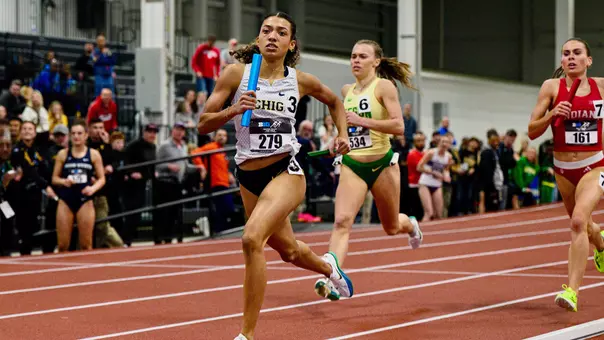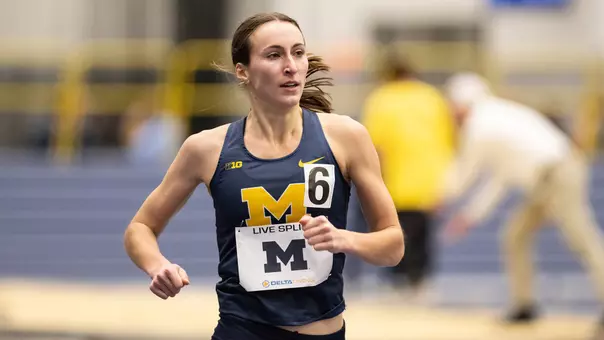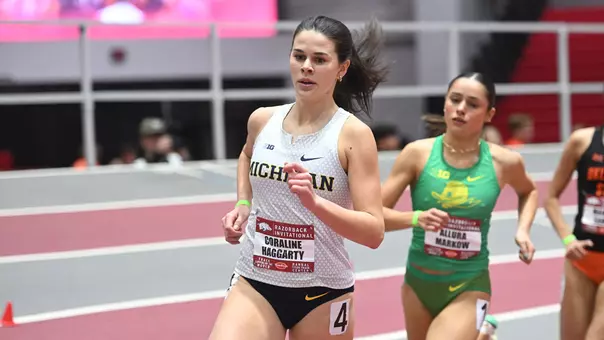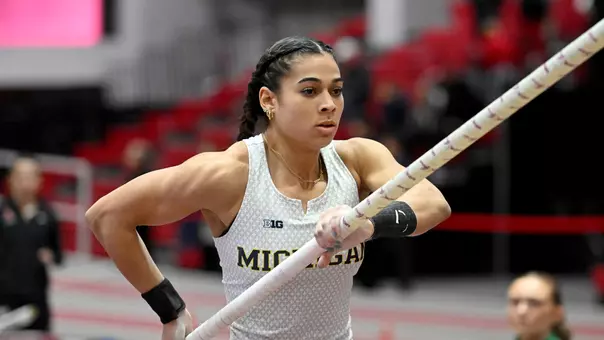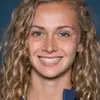
Alice Hill: An Unexpected Steeplechase Star
7/25/2018 2:17:00 PM | Women's Track & Field
Over the span of a single month, rising sophomore Alice Hill of the University of Michigan women's track and field team went from having never run the 3,000-meter steeplechase in June to finishing seventh at the IAAF World U20 Championships and among the fastest teenagers in the event in American history. This is the first of a three-part, long-form feature which chronicles not just that meteoric month, but also the unique circumstances in the preceding years, months and weeks that led to her rise.
As the long Nordic summer daylight hours of Tampere, Finland, waned near their end, the bell rang for Alice Hill.
A month earlier, the University of Michigan rising sophomore distance runner expected to be on a much different overseas adventure with her inaugural collegiate track and field season well in the rearview mirror: a study-abroad trip to Tanzania in eastern sub-Saharan Africa that had been in the works since Thanksgiving 2017.
Instead, here she was, with just one lap to go in the throes of the closing moments of the 3,000-meter steeplechase final at the IAAF World U20 Championships on July 14, donning not the Maize and Blue of Michigan, but the Red, White and Blue of Team USA.
And, to boot, running in an event in which she had made her lifetime debut less than a month earlier, over a distance Hill could count on just one hand the number of times she had raced.
Nothing about this moment was familiar or expected. Not the location, not the stakes and certainly not the event.
In completely uncharted territory, Hill -- if not completely subconsciously -- did the only thing that made sense in the moment: she let instinct take over.
"I feel like I usually don't consciously think, 'OK, now's the time to kick,'" Hill said. "My body just starts going and I think, 'OK, here we go.'
"It's kind of like that in workouts. When you think you're dead, but then your body keeps going and just manages to go a little bit faster on the last rep. You don't really know where that came from, but it just happened."
That instinctual drive -- coupled with a booming voice of guidance from U-M women's distance coach Mike McGuire hailing from the bleachers down the backstretch of the track -- propelled the first-year Wolverine Hill over the last five immovable 30-inch tall barriers, including the final leap of faith into the event's signature water pit with about 150 meters left in the race.
"Her engagement in the final was superb," McGuire said. "I thought we had a good race plan for her and she executed. She has great competitive instincts. She was very responsive when I had instructions. Anytime there was a call to move up, she was able to respond to that."
With less than 100 meters to go, Hill -- who, once upon a time in high school, was an acclaimed 300-meter hurdler -- negotiated the final obstacle and moved up to engage Germany's Lisa Oed in a sprint to the finish line.
She was not aware of her pace. She was vaguely aware of her standing in the field. She was nearly completely unaware of Oed's presence alongside her over the last 100 meters (she only became aware of Oed well afterwards, "Because I saw pictures of the finish after the race," Hill said).
Digging deep, her focus was so singular on just getting to the white line stretched across the track ahead of her that it did not break until the moment she crossed the finish.
Looking over to her left at the display board on the infield, she saw the clock not yet switched from nine minutes to 10 minutes -- a result that was confirmed as final standings began populating on the scoreboard.
Alice Hill had just run a career-best 9:57.04, good for seventh place in the world, and for the best finish among any finisher not from the steeplechase talent hotbeds of Africa.
Just like that, she was one of the best steeplechasers in Michigan history, joining only Anna Willard and Claire Borchers as the lone sub-10-minute Wolverines in history.
Just like that, she could count herself as one of the best collegiate steeplechasers in the country, with a time that ranked her as the top returning athlete in the Big Ten for the 2019 season and one of the top-15 returners in the NCAA.
And just like that, she was among the best young steeplechasers in American history, ranked No. 5 all-time among only six U.S. teenagers who have cracked 10 minutes in the event.
All of that in just her third steeplechase race, and her seventh race on the track measuring 1,500 meters or farther.
"I think I just started smiling and then I just didn't stop the rest of the evening," Hill said.
Given the road to this moment -- a journey that was as uncertain and challenging as it was meteoric -- the smile was a well-deserved reward.

Among those six American teenagers who have cracked into the nine-minute range for the steeplechase -- Hill, Madison Boreman of Colorado (2017), Devin Clark of Arkansas (2016), Kristlin Gear of Furman (2018), Sarah Edwards of Virginia Tech (2017) and Hannah Steelman of Wofford (2018) -- Hill is something of an anomaly.
Distance running experience is abundant between those other five women. All five ran and excelled in cross country in both high school and in the college season leading up to their steeplechase debuts. Between them, each member of that group averaged nearly 40 career track races of 1,500 meters or farther heading into their inaugural steeple races and 13 career races of 3,000 meters or farther.
Hill could not have taken a more different path to end up at the same destination.
Not only did she never run cross country while at Pioneer High School in Ann Arbor, she had only ever run four career races on the track longer than 800 meters before her first steeplechase competition, and none farther than a mile.
And long before she came to track and field in seventh grade -- an inroad that was made by way of the hurdles -- Hill had already developed a first athletic love.
"I played field hockey since third or fourth grade because I joined a team with my friends that lived in my neighborhood," Hill said. "After then through high school, through early high school, field hockey was my life. I was so set on being a field hockey player in college."
Though she developed into an All-State player who helped lead her team to three state titles in high school, she never quite reached that level of talent, and certainly did not approach it in time to jump onto the recruiting radar as a sophomore.
Disappointed, but not wanting to sacrifice her academic ambitions to be part of a field hockey team at a smaller school, she turned her attention more toward track throughout the second half of her high school career.
Hill had been pulling double-duty on the field hockey and track teams since middle school, when she was first introduced to the latter in a gym class.
"In gym class we tried doing some hurdling because we were doing all sorts of different activities, and I thought, 'Oh, that sounds like fun,'" Hill said. "No one else wants to do it. I'm going to prove myself; everyone else is too afraid to do it, but I'm going to do it."
Prove herself, she did. She finished 10th at the 2014 MHSAA Division 1 State Finals in the 300-meter hurdles as a freshman in high school, and followed that up as a sophomore in 2015 with a fourth-place showing in the 300-meter hurdles and an eighth-place effort in the 100-meter hurdles, in addition to a leg of the runner-up 4x400 relay.
Her career and her life were both shaken up in July 2015, however, when she and the Pioneer community suffered the death of longtime track and field coach Bryan Westfield to esophageal cancer.
With Coach Westfield no longer guiding her, she transitioned from running the hurdles to running mid-distance races -- particularly the 800 meters. By the time the 2016 indoor season rolled around, she had won the indoor MITS state title at 800 meters in late February and went on to take eighth at the New Balance Nationals Indoor meet in mid-March in a blistering 2:12.10.
Her outdoor season was even more of a revelation. Though she continued to run the 300-meter hurdles (running a career-best 43.56 along the way), her championship-season focus shifted fully to the mid-distances. She was the MHSAA Division 1 runner-up at 800 meters and followed that up with a sixth-place, 2:09.09 showing at New Balance Nationals.
"That just opened whole new doors," Hill said. "Before then, I'd liked running. It was just something I did, I really enjoyed being on the team, but I hadn't really thought about anything in the future with relation to that. So, it was only after that year, up to my junior year, but my coach said, 'You know, you could really do this. The Michigan coach has shown an interest.' And I thought to myself, 'Oh, wow, oh my goodness.'"
She would go on in her senior year to finish third at the MHSAA State Finals and 18th at New Balance Nationals, but by that point that Michigan coach -- McGuire -- was well sold on her potential as a contributor at Michigan, and was intrigued by her potential as a steeplechaser.
"It was definitely a conversation," McGuire said. "We had a lot of conversations, because we knew she was an athlete. If you're an athlete, we can figure it out. The 800, mile, steeplechase and 400-meter hurdles were all possibilities."
McGuire, who coached steeplechaser Anna Willard in 2007 to the NCAA title and a then-collegiate record, was certainly the more knowledgeable of the two in those conversations.
"Well, we've been talking about that since high school," Hill said. "But yeah, I didn't really know what the steeplechase was in high school. But I was thinking, 'That sounds like so much fun. I love that!'"
At first, though, Hill found that neither of those two assumptions were proving to come true.
Alice Hill's story continues on Thursday (July 26) with her arrival at Michigan and taking the first tentative -- and sometimes untenable -- steps in her steeplechase development on the road to her career debut.

